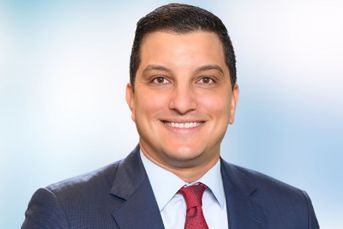A novel idea
An industry vet pitches ideas to Finra brass on how regulators and reps can work together to protect investors and create more streamlined and efficient compliance for advisers. Imagine that.
Many financial advisers spent the last week of August savoring the final days of summer vacation, hanging out with their families on the beach or by a lake.
One veteran adviser and registered representative, Frank Congemi, chose to spend his final summer afternoons in a far less sunny and breezy locale: the headquarters of the Financial Industry Regulatory Authority Inc. in lower Manhattan.
Mr. Congemi, who likes to tell stories of his days blowing the whistle on junk bond king Michael Milken almost 30 years ago, sat across a table Aug. 28 from Finra chief Richard G. Ketchum and Chip Jones, senior vice president of member relations. He pitched to Finra executives ideas on how regulators and reps can work together to protect investors and, in the process, create more streamlined and efficient compliance for advisers.
If the two often-adversarial sides — broker-dealers and regulators — work together as doctors and lawyers do with the American Medical Association and the American Bar Association, respectively, consumers likely will feel more trust in the financial advice industry, Mr. Congemi argues.
“Advisers can help themselves by partnering with their regulator like doctors and the AMA,” he said.
“Finra is our group, like it or not. Why wouldn’t I want them to know the good stuff I’m doing or tell them when I think they’re screwing up?” Mr. Congemi said.
“I think the regulators can make life better for advisers like me,” said Mr. Congemi, who oversees about $80 million in client assets.
Longtime critic
Mr. Congemi, 60, is affiliated with LPL Financial LLC and is a longtime, freewheeling critic of both Wall Street bankers and Washington regulators. In 2010, he paid to run radio spots in New York that lambasted government officials and Wall Street firms for the financial crisis. During the rise of Occupy Wall Street in 2011, Mr. Congemi inserted himself into the debate when he agreed to pay $5,000 to sponsor a dinner after The Goldman Sachs Group Inc. dropped it because Occupy Wall Street was scheduled to be honored.
But Mr. Congemi’s current effort to connect the financial advice industry and Finra could prove quixotic.
The idea of such a partnership between Finra and the advisers and reps working under the self-regulatory organization’s rules is anathema to many, if not most, in the industry. Finra is the primary regulator for the securities industry and has authority over 4,289 broker-dealers and 633,632 individual registered reps.
Regulators and reps are prone to view one another with dislike.
Still, the seemingly opposing sides need each other, Mr. Congemi said. Reps and Finra have little alternative to working together if the two sides want to fulfill their goals of helping and protecting investors, he said.
Although declining to divulge the specific details of his private conversation with Mr. Jones and Mr. Ketchum, Mr. Congemi discussed, in general, parts of his proposal to the Finra brass. His ideas focus on improving communication between regulators and reps.
“Advisers need to be informed on an ongoing basis when regulators or a state attorney general’s office proposes changes in the suitability of an investment or there are restrictions on an investment,” he said.
Despite their operating under different standards, brokers, who are salespeople, and advisers, who are fiduciaries, aim to put their clients’ interests first, Mr. Congemi said.
“If a client is 70 years or older, the adviser documents whether he or she is working with the client’s accountant and attorney, and knows the beneficiaries and where the money will go after the death of the client,” he said. “It would be part of a compliance checklist and give the adviser protection if later there was an investor complaint.”
Such efforts would help create broader trust among advisers, clients and regulators, Mr. Congemi said.
Finra and the Securities and Exchange Commission have no definitive education program about the basics of investing, but advisers and regulators could create and teach one together, he said.
“Of course the regulators would not endorse such a program, but shouldn’t the regulators and advisers team up to figure out what people should know about investing?” Mr. Congemi asked.
“We could have a Finra-sponsored event with regulators in the room and an adviser talking broadly about investing,” he said.
“The Finra monitor would have to have a license, too. The adviser could even get [continuing-education] credits,” Mr. Congemi said.
Win, win, win
Advisers, clients and regulators all would win, he said.
“Clients would feel more comfortable by getting real knowledge and a holistic education, and Finra can evaluate those advisers and maybe use them in the future,” Mr. Congemi said.
Finra spokeswoman Nancy Condon declined to comment.
Mr. Congemi also is calling for quarterly lunch meetings between regulators and reps in specific regions, and is working to set up the first such meeting in the coming weeks in Boca Raton, Fla.
Breaking down barriers between the two sides is essential, he said.
“How are you going to build trust with anybody if they’re beating you over the head regularly or if you’re afraid of being beaten over the head regularly?” Mr. Congemi asked.
The combined forces of rapidly aging baby boomers and a dearth of young people entering the investment advice business could work to push the two adversaries together, he said.
“The older investors get, the more problems there will be,” Mr. Congemi said.
To tackle those coming troubles, “the industry has to be creative and get advisers and broker-dealers involved with regulators,” he said.
For more on the meeting in Boca Raton, contact Mr. Congemi at [email protected].
Learn more about reprints and licensing for this article.








